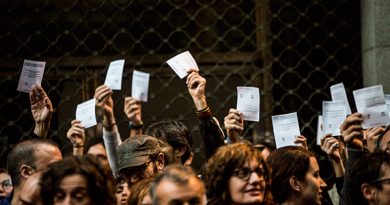Focus on Freedom of Expression: India
By Daniel D’Amico
Staff Writer
In India, many claim that their freedom of expression has been violated by the government, and recently activists turned their attention to push for increased protection of Indian rights.
One of these instances was the assassination Professor M. M. Kalburgi, thought to be a result of his ideas.
According to an article in the Hindu, Professor Kalburgi challenged certain teachings of Chenna Basavanna, an advocate for spiritual revolution around the twelfth century, which sparked protests that led to many debates on the topics of freedom of speech and expression. Kalburgi also stated that Hinduism is not a religion.
Many were angered when their traditional beliefs were challenged. One of the alleged assassins, Bhuvith Shetty, posted a comment on Twitter to another scholar, threatening, “You’re next.”
The Economic Times discusses how renowned actress and filmmaker Nandita Das spoke out against the growing threat that freedom of expression is facing.
She talks about the murders of Narendra Dabholkar, Govind Pansare, and M. M. Kalburgi and how they died defending “free speech and rational thinking.”
Das also brought up other affronts against freedom of expression, such as the vandalising of M.F. Husain’s paintings and the banning of Perumal Murugan’s book.
Similarly, their works were targeted due to their message. She expresses her hope for the future and states that people must continue to band together and speak out against these violations.
The India Times talks about notable writers such as Salman Rushdie, among others, calling for the U.K. Prime Minister David Cameron to support freedom of expression himself. They claim that the Indian legal system makes it very easy to suppress others. As a result, they want Cameron to intervene to help protect their rights.
As seen in an article in The Hindu, many different companies are protesting to show how they feel about the attempts to suppress free speech. They marched with signs of various champions of freedom of expression such as Edward Snowden and Nelson Mandela.
Many in various fields returned awards they won in protest of those who have killed, vandalized or banned others or their works. These include authors and actors such as Hindi author Kashinath Singh. There were also some members of the Bharatiya Janata Party, the largest political party in India, who returned awards they received.
However, not all protesters agree on the means used to protest. There is a debate over just how effective certain methods are.
The New Indian Express speaks of well-known authors such as P. Valsala and M. T. Vasudevan Nair in addition to others who express their disapproval of protesters returning their awards. They criticize this action as ineffective and do not believe it is necessary.
This is because they feel that it does nothing to further their cause. They have also criticized protesters for distancing themselves from corporations. They believe that through these corporations, it will be easier to achieve some progress in freedom of expression reforms.
The attempts to suppress freedom of expression have even reached the newest James Bond movie, Spectre.
As reported by the Los Angeles Times, the Indian film board has requested that certain scenes and language be cut when they show it. Although Sony cooperated, this act angered many Indian people as they believe it “illustrates increasing prudishness by the film board.”
Despite protests and angry citizens, the president has a more positive outlook. As stated in an article in News Track India, Indian President Shri Pranab Mukherjee said that he feels the media has always supported the freedom of expression of individuals. He praised the media for constantly fighting authoritative tendencies.
While this may be, he did not add a comment on those who were silenced for their publications and actions.

